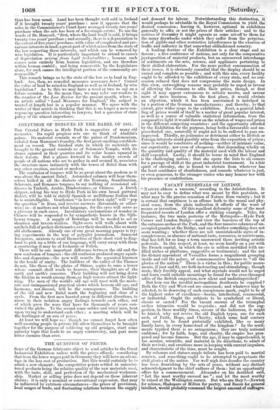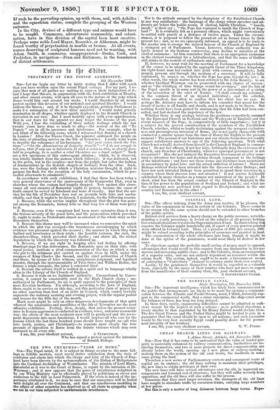VACANT PEDESTALS OF LONDON.
" NATURE abhors a vacuum," according to the Aristotelians. It may not be easy to define what was meant by this postulate, or what may be the precise sensation of Nature from vacuity ; but it is certain that emptiness is an offence both to the moral and physical sense, from the plain indication it affords of the want of means or invention. Of this repellent deformity some of the most frequented resorts of London offer a striking example. Take, for instance, the two main posterns of the Metropolis—Hyde Park Corner and London Bridge—and view the bareness of the top of the entrance-arches at the Park, and the four massive columns of unoccupied granite at the Bridge, and say whether something does not seem wanting; whether there are not nnmistakeable signs of incompleteness, or absence of national taste, resources, or contrivance, that has left for so long a term uncrowned those inviting artistic pedestals. In this respect, at least, we seem hardly on a par with the French capital, in which the eye is seldom mortified with unfilled niches or platforms, suggestive or testimonial; and the not far distant appendant of Versailles forms a magnificent grouping inside and out the palace, of commemorative honours to "all the glories of the nation." There is a virtue in this ; for public monuments, if just and fit, are both instructing and stimulating ; though mute, they forcibly appeal, and what myriads would not be urged and learn could suitable mountings be found for the ever-thronged adits of the British emporium, now silent and undistinguished !
But how can the needful metropolitan desiderata be supplied ? Both the City and West-end are concerned; and whatever may be selected, to be deserving of such conspicuous mark, ought to be of the highest order of excellence—heroic, intellectual, commercial, or industrial. Ought the subjects to be symbolical or literal, classic or sacred ? For the vacant crowns of the triumphal arches triumvirs would be requisite ; and did not the suggestion, in these worldly times, savour of the ludicrous, it might be hinted, why not revive the old English types, one for each arch, of Faith, Hope, and Charity, which some half century past used to be found pictorially exhibited, like so many family lares in every homestead of the kingdom ? In the sentiments typified there is no antagonism ; they are truly national emblems ; for by faith, hope, and charity, the empire has pros. pered and become famous. But the age, it may be apprehended, is too secular, scientific, and material in its directions, to admit of their revival; and creations more in keeping with current impulses, and characteristic of the time, must be sought.
By columns and statues ample tribute has been paid to martial renown, and something ought to be attempted to perpetuate the civil glories of the nation. For well nigh four decades the country has been flourishing by the arts of peace, without any distinct acknowledgment to the chief authors of them : but an opportunity offers for a commencement. Alexander on his deathbed said, "Let the most worthy succeed me " ; and let the most worthy be raised at the Wellington corner. But who are they P—Newton for science, Slaakspere or Milton for poetry, and Bacon for general intellect, would probably command the largest amount of suthuges. If such be the pervading opinion, up with them, and, with .A.chilles and the equestrian statue, complete the grouping of the Western entrance. In the City, devices of a different type and animus would have to be sought. Commerce, adventurous seamanship, and colonization, have in this division of the eapital been most creative. Perhaps some noble Lord Mayor, Recorder, or Alderman, might be found worthy of perpetuation in marble or bronze. At all events, names deserving of sculptural honours need not be wanting, with Adam Smith, in commerce, unappropriated—Drake, Cook, and Frobisher, in navigation—Penn and Baltimore, in the foundation of distant settlements.

























 Previous page
Previous page